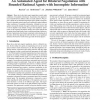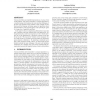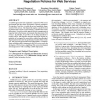37 search results - page 5 / 8 » The Benefits of Opponent Models in Negotiation |
90
Voted
ATAL
2007
Springer
15 years 8 months ago
2007
Springer
Successful negotiators prepare by determining their position along five dimensions: Legitimacy, Options, Goals, Independence, and Commitment, (LOGIC). We introduce a negotiation ...
129
Voted
ECAI
2006
Springer
15 years 5 months ago
2006
Springer
Many day-to-day tasks require negotiation, mostly under conditions of incomplete information. In particular, the opponent's exact tradeoff between different offers is usually ...
122
click to vote
MAGS
2008
15 years 1 months ago
2008
This paper presents a decentralized model that allows self-interested agents to reach "win-win" agreements in a multi-attribute negotiation. The model is based on an alt...
111
click to vote
ATAL
2007
Springer
15 years 8 months ago
2007
Springer
Canonical problems are simplified representations of a class of real world problems. They allow researchers to compare algorithms in a standard setting which captures the most im...
104
click to vote
WWW
2004
ACM
16 years 2 months ago
2004
ACM
A scalable approach to trust negotiation is required in Web service environments that have large and dynamic requester populations. We introduce Trust-Serv, a model-driven trust n...



